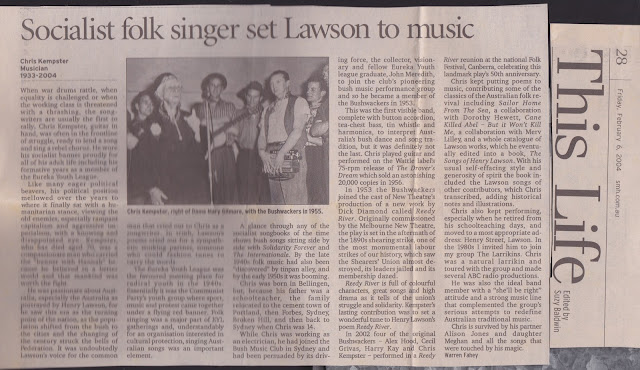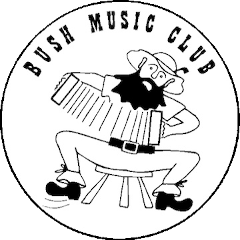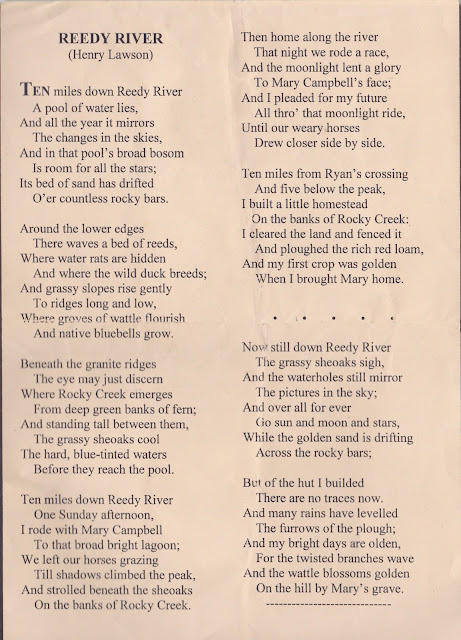(photos © Bob Bolton)
Mark Gregory's Chris Kempster site has it all (or almost all!)
Obit - Chris Kempster at Mudcat Cafe website
Christmas Card sent to Chris & Alison's friends December 2003, thanks to Alison for permission to publish it.

photo supplied by Alison Jones
~~~~~~~~~~~~~~~~~~~~~
Photos taken at Chris's funeral, © Bob Bolton

1.

2.

3. Bob McInnis

4.

5.

6.

7. Margaret Walters, Chris Wheeler, Alison Jones, Margaret Fagan, Kate Delaney

8.

9.

10.

11. Bob Fagan

12. Keith McKenry

13. Alison, Chloe & Jason Roweth

14.

15.

16. Mark Gregory

17. John Dengate

18.

19.

20.

21.

22.

23.

24. Tom & Silvia Salisbury who were in the first Sydney production of Reedy River

25. Bob McInnis
~~~~~~~~~~~~~~~~
http://folkstream.com/reviews/chris/keith.html - Obituary by Keith McKenry, First published in The Australian, February 2004)
Born: Bellingen, NSW 24 August 1933
Died: Katoomba, 24 January 2004
In 1949, sixteen year old Chris Kempster sat in a Sydney bus reading a book of Henry Lawson's poems. As he read Reedy River, a tune came into his head and wouldn't go away. Thus began Kempster's lifelong devotion to setting Lawson to music, and to the folk music revival.
The youthful Kempster was a committed socialist and keen member of the Eureka Youth League. He sang Reedy River to a League camp and in 1951 it travelled to the World Youth Forum in Berlin. The following year it was featured at the Youth Carnival for Peace and Fellowship in Sydney. In 1953 it became the title song for the New Theatre's ground-breaking musical play, Reedy River. The play broke all records for an Australian musical and has since been revived many times. The song itself is now an Australian classic.
Kempster appeared in Reedy River as a member of the Bushwhackers, a pioneering musical group led by fellow socialist and folk song collector, John Meredith. The Bushwhackers were the first-ever bush band, complete with tea chest bass, lagerphone (bottle-tops nailed loosely to a broomstick), mouth organ, accordion and, in a rare concession to fashion, guitar. The group appeared in hundreds of performances of Reedy River, and played to mainly left-wing functions around Sydney and its environs. No-one ever got paid, so Kempster worked by day at his trade as an electrician, and played music at night and at weekends.
In 1955 the Bushwhackers' 78rpm recording of The Drover's Dream became Australia's first folk ‘hit'. Two years later the group appeared in Cecil Holmes' Australian feature film Three-In-One, the gangly Kempster playing the role of ‘Longun'. But tension had developed in the group over performance style, Meredith insisting everyone always sing in unison. Kempster wanted a more adventurous approach and when he persisted in singing harmony Meredith disbanded the group.
Kempster and fellow band members Alex Hood and Harry Kay formed a new group, the Rambleers They too sang bush songs but their style was influenced by the American group the Weavers, and by the Englishman A.L. Lloyd. The group made several important recordings on the Wattle label. (These recordings recently were re-released on CD by the National Library of Australia).
Kempster later played in other groups and for many years was resident MC at the Sydney Bush Music Club. In the early 1960s he enrolled at Sydney University, becoming President of its influential Folk Music Society and playing a pivotal role in introducing to Australian audiences performers such as Declan Affley and Jeannie Lewis and introducing them, too, in the era of Vietnam and conscription, to the protest songs of performers like the young Bob Dylan. Leaving university, he became a school-teacher.
But always Kempster's inspiration was Henry Lawson. He set many Lawson poems to music and worked lovingly on a major Lawson songbook. He was flooded with offerings from Australia and overseas. Slim Dusty contributed 18 songs, jazzman Ade Monsborough 10 – one person offered 80! When The Songs of Henry Lawson appeared in 1989, it had been pruned to 132 poems, some – like Andy's Gone With Cattle – having as many as eight different tunes. A number of these songs – such as Priscilla Herdman's setting of The Water Lily and Kempster's own settings of Do You Think That I Do Not Know and, of course, Reedy River, have been recorded many times both in Australia and overseas.
Afflicted throughout his life with severe asthma, Kempster resigned from teaching in 1988, devoting himself to writing and performing. In 2000 he moved to a new Blue Mountains home in Henry St Lawson, a location he insisted was a total coincidence. Reunion festival performances with the surviving Bushwhackers and the Rambleers followed. Sadly however his health was deteriorating, and on 24 January he died in Katoomba Hospital after a lengthy illness.
An easy-going but inspiring character, Chris Kempster had both vision and laconic wisdom. With his passing there can be no more reunions of our pioneering bush bands, and the Australian folk community has lost one of its most beloved sons. He is survived by his partner Alison Jones and daughter Meghan.
~~~~~~~~~~~~~~~~~~
.
 |
| Sydney Morning Herald obit by Warren Fahey |
Socialist folk singer set Lawson to music Obituary by Warren Fahey, Sydney Morning Herald,
When war drums rattle, when equality is challenged or when the working class is threatened with a thrashing, the song- writers are usually the first to rally. Chris Kempster, guitar in hand, was often in the frontline of struggle, ready to lend a song and sing a rebel chorus. He wore his socialist banner proudly for all of his adult life including his formative years as a member of the Eureka Youth League.
Like many eager political beavers, his political position mellowed over the years to where it finally sat with a humanitarian stance, viewing the old enemies, especially rampant capitalism and aggressive imperialism, with a knowing and disappointed eye. Kempster, who has died aged 70, was a compassionate man who carried the "banner with Hannah" because he believed in a better world and that mankind was worth the fight.
He was passionate about Australia, especially the Australia as portrayed by Henry Lawson, for he saw this era as the turning point of the nation, as the population shifted from the bush to the cities and the changing of the century struck the bells of Federation. It was undoubtedly Lawson's voice for the common man that cried out to Chris as a songwriter. In truth, Lawson's poems cried out for a sympathetic working partner, someone who could fashion tunes to carry the words.
The Eureka Youth League was the favoured meeting place for radical youth in the 1940s. Essentially it was the Communist Party's youth group where sport, music and protest came together under a flying red banner. Folk singing was a major part of EYL gatherings and, understandably for an organisation interested in cultural protection, singing Australian songs was an important element.
A glance through any of the socialist songbooks of the time shows bush songs sitting side by side with Solidarity Forever and The Internationale. By the late 1940s folk music had also been "discovered" by tinpan alley, and by the early 1950s it was booming.
Chris was born in Bellingen, but, because his father was a schoolteacher, the family relocated to the cement town of Portland, then Forbes, Sydney, Broken Hill, and then back to Sydney when Chris was 14.
While Chris was working as an electrician, he had joined the Bush Music Club in Sydney and had been persuaded by its driving force, the collector, visionary and fellow Eureka Youth league graduate, John Meredith, to join the club's pioneering bush music performance group and so he became a member of the Bushwhackers in 1953.
This was the first visible band, complete with button accordion, tea-chest bass, tin whistle and harmonica, to interpret Australia's bush dance and song tradition, but it was definitely not the last. Chris played guitar and performed on the Wattle label's 75-rpm release of The Drover's Dream which sold an astonishing 20,000 copies in 1956.
In 1953 the Bushwhackers joined the cast of New Theatre's production of a new work by Dick Diamond called Reedy River. Originally commissioned by the Melbourne New Theatre, the play is set in the aftermath of the 1890s shearing strike, one of the most monumental labour strikes of our history, which saw the Shearers' Union almost destroyed, its leaders jailed and its membership dazed.
Reedy River is full of colourful characters, great songs and high drama as it tells of the union's struggle and solidarity. Kempster's lasting contribution was to set a wonderful tune to Henry Lawson's poem Reedy River.
In 2002 four of the original Bushwhackers - Alex Hood, Cecil Grivas, Harry Kay and Chris Kempster - performed in a Reedy River reunion at the National Folk Festival, Canberra, celebrating this landmark play's 50th anniversary.
Chris kept putting poems to music, contributing some of the classics of the Australian folk revival including Sailor Home From The Sea, a collaboration with Dorothy Hewett, Cane Killed Abel - But it Won't Kill Me, a collaboration with Merv Lilley, and a whole catalogue of Lawson works, which he eventually edited into a book, The Songs of Henry Lawson. With his usual self-effacing style and generosity of spirit the book included the Lawson songs of other contributors, which Chris transcribed, adding historical notes and illustrations.
Chris also kept performing, especially when he retired from his schoolteaching days, and moved to a most appropriate address: Henry Street, Lawson. In the 1980s I invited him to join my group The Larrikins. Chris was a natural larrikin and toured with the group and made several ABC radio productions.
He was also the ideal band member with a "she'll be right" attitude and a strong music line that complemented the group's serious attempts to redefine Australian traditional music.
Chris is survived by his partner Alison Jones and daughter Meghan and all the songs that were touched by his magic.
************************************************************************************************* *************************************************************************************************








No comments:
Post a Comment